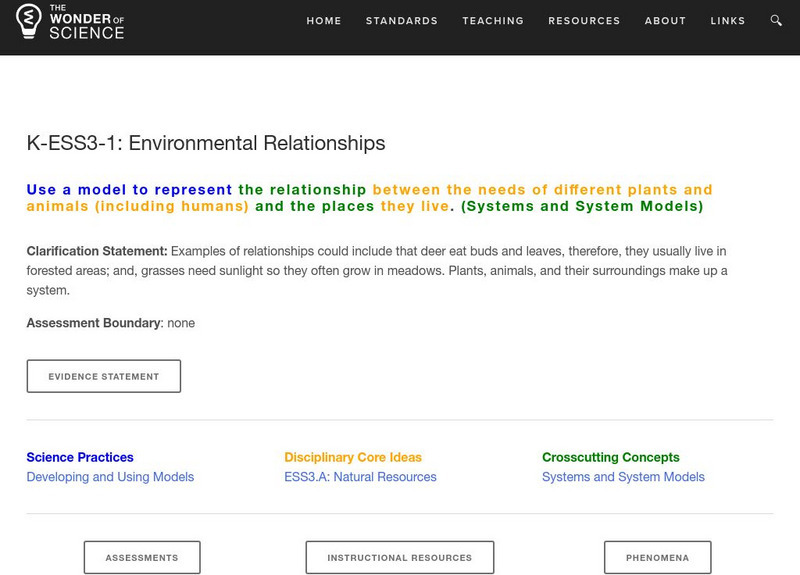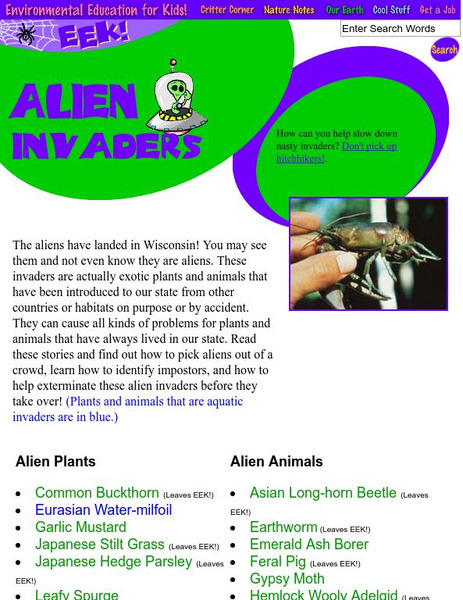Hi, what do you want to do?
American Museum of Natural History
Going, Going...Gone?
Young environmentalists consider how scientists are attempting to save endangered species. They read about what causes extinction and steps to take to minimize the threats.
American Museum of Natural History
Bio-Benefits
Kick-start a discussion of the importance of biodiversity with a colorful resource that touts the benefits of maintaining healthy ecosystems. The images stress the interdependence of all the elements of an ecosystem.
American Museum of Natural History
Life in the City
Believe it or not, biodiversity exists even in areas of disturbed habitat. An interactive activity challenges learners to look for species with a magnifying lens in an image of a city habitat. Pop-up images and descriptions explain how...
Environmental Education for Kids
Eek!: Habitats: Forest
Forests are more than just trees. They are a complex community of plants and animals that constantly change, grow, and interact with each other and the nutrient-bearing soils upon which they depend. Read about some of the many plants and...
Environmental Education for Kids
Eek!: Habitats: Prairie
Learn what prairies are, about the plants and wildlife that live there, and about the environmental efforts being made to restore them.
The Wonder of Science
The Wonder of Science: K Ess3 1: Environmental Relationships
This NSTA vetted source includes resources to teach about the relationship between the needs of different plants and animals and the places they live. Included are assessment ideas, videos, examples, lesson plans, and photos of student...
The Wonder of Science
The Wonder of Science: K Ess2 2: Environmental Change
This NSTA vetted source includes resources to teach how plants and animals (including humans) can change the environment to meet their needs. Included are assessment ideas, videos, examples, lesson plans, and photos of student work.
Environmental Education for Kids
Eek!: Habitats
Take a look at some of the different habitats that are home to many plants and animals including black bears, owls and various species of birds.
Thomas Jefferson National Accelerator Facility
Jefferson Lab: Where Plants and Animals Live
Read and fill in the blanks of this passage explaining habitats where plants and animals live. Each blank has a dropdown menu with choices. When you finish, click CHECK MY ANSWERS. If you pick a wrong answer, the right answer will be...
NOAA
Noaa: Year of the Ocean, Kids and Teachers Corner
Great resources on a variety of ocean and environmental concerns, endangered plants and animals, climate and habitats, frequently asked questions and fact sheets.
Environmental Education for Kids
Eek!: Alien Invaders
The aliens have landed in Wisconsin! You may see them and not even know they are aliens. These invaders are actually exotic plants and animals that have been introduced to our state from other countries or habitats on purpose or by...
Other
Ttu: Alpine Tundra
Information on the land uses, plants, wildlife, habitats and soil. There are literature citings at the bottom of the page.
Other
The Rspb: A to Z of a Wildlife Garden
Learn the steps to making a good wildlife garden that attracts all types of wildlife.
California Academy of Sciences
California Academy of Sciences: Mountains
Look at pictures of some well known mountain ranges and read about the habitats, climate, plants and animals that are found on them. There is a link for additional information about the cold aeolian zone.













